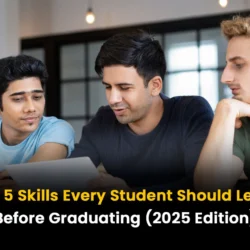Cracking a competitive government exam is the dream of almost every student and job seeker in India. But when lakhs of people are competing for limited seats, even a small mistake can reduce your chances of selection. Most students focus only on studying hard, but along with that, it is equally important to avoid common preparation mistakes.
In this blog, we will talk about the 10 most common mistakes that candidates make while preparing for government exams, and how you can smartly avoid them.
10 Common Mistakes to Avoid
1. Lack of a Clear Study Plan
Most of the students start their preparation without any timetable or clear goal. This creates a lot of confusion, studies cannot be done regularly, and a lot of time gets wasted.
Tip: Make a realistic timetable that covers your entire syllabus, and give more time to your weak subjects. Set small targets for each day and follow that plan consistently.
2. Ignoring the Exam Syllabus
Some aspirants start reading everything without checking the official syllabus. Due to this, their time gets wasted on unimportant topics and important topics are missed. First, understand the syllabus carefully, then prepare accordingly.
Tip: Download the official syllabus from the exam authority’s website and plan your studies around it only. This approach will keep you focused, and you will not waste time on irrelevant topics.
3. Overdependence on Coaching Institutes
Taking coaching can be helpful for you, but depending only on coaching without self-study can be harmful for you. The study material of every coaching centre is not exam-oriented, so your analysis and revision are important.
Tip: Use coaching only as a guide, but rely on self-study, your own analysis, and regular reviews to understand the concepts better.
4. Skipping Previous Year Question Papers
Many students ignore solving old question papers, but these papers are very important to understand the exam pattern and difficulty level.
Tip: Practice question papers of at least the last 5-10 years. This will increase your speed and confidence, and the topics that come up frequently will also be identified.
5. Not Taking Mock Tests Regularly
Mock tests give you the experience of a real exam-like environment. If you avoid them, it becomes difficult to manage time in the actual exam.
Tip: You should take mock tests every week, analyse your performance from time to time, and work on your weak points. Nowadays, there are many free and paid platforms available that provide good-quality mock tests.
6. Focusing Only on Strong Subjects
Students prefer to revise those subjects in which they are already good and avoid those subjects that are difficult. This causes an imbalance in preparation and leads to low scores in weak sections.
Tip: Allot extra time for weak subjects and gradually build confidence in them.
7. Neglecting Current Affairs
Current affairs are very important in exams like the SSC, UPSC and banking. Many students either skip this section or study from unreliable sources.
Tip: You should read a trusted current affairs digest daily or follow a good YouTube/news channel. Make a revision notebook every month in which important points are written.
8. Poor Time Management
Some aspirants spend too much time on a single subject or keep postponing important topics again and again.
Tip: Follow the Pomodoro technique or fixed hourly slots for each subject. Use study times or apps for better control.
9. Lack of Revision
Just studying your syllabus once will not work. If there is no revision, students forget many topics before the exam.
Tip: Keep 25–30% of your preparation time just for revision. Make short notes and mind maps to revise quickly.
10. Ignoring Health and Sleep
Many aspirants study for long hours without taking breaks, which results in burnout, poor concentration, and sometimes even illness.
Tip: Take care of your health. Get 6–8 hours of sleep every day, eat healthy food, and do light physical activity or meditation.
Conclusion
Avoiding these common mistakes can make your exam preparation much better and will help you perform well in times of pressure. Remember, success in government exams depends not only on how much you study but also on how smartly you prepare for it.
Stay consistent, stay healthy, and stay focused.
Bonus Tip: Join Telegram or WhatsApp study groups that share daily quizzes, updates and peer discussions. But be careful that these don’t become your distraction – use them smartly only for motivation and resources.













